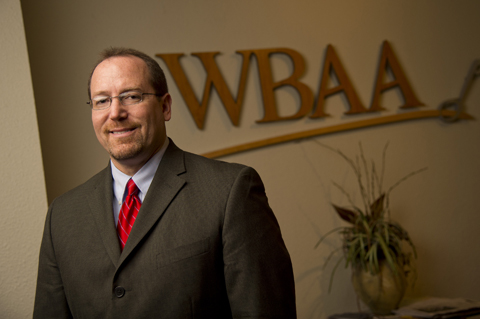Purdue Profiles: Mike Savage
September 9, 2014
 |
|
Mike Savage, general manager of WBAA public radio. (Photo provided) |
Mike Savage comes to work every day with one goal in mind: connecting listeners of WBAA public radio through its comprehensive local news coverage and programming.
Savage is WBAA's general manager. As such, he oversees the station's entire operation, including efforts to expand local news offerings and to make its content available digitally. He also was recently elected as a member director to the National Public Radio (NPR) Board of Directors. He is the first representative from Purdue to serve on the board.
What are some of your duties as general manager?
I have a wide range of responsibilities, to meeting regularly with our 10 staff members to hosting an afternoon radio show to recording messages for various on-air components. I've also worked hard to create a positive work environment that encourages staff members to collaborate, reach for excellence and generally do their best on the job.
WBAA is the only public radio station in our community, so we have a tremendous responsibility to our listeners. Our goal is to provide content that engages listeners in public affairs and generally connects them to the community -- both to Purdue and to Greater Lafayette at large. We provide a valuable service that's been around in some form for more than 90 years.
What are some changes you've overseen at WBAA since you became general manager?
At WBAA, we generally broadcast news on the AM channel, classical music on the FM channel and jazz on the HD channel.
Since I become general manager in November 2013, we have expanded our local news offerings. We've started doing longer local features and interviews. For instance, we've started airing weekly interviews with local mayors. Soon, we're going to start airing regular interviews with Morgan Burke, Purdue's director of athletics.
In the past two years, we've expanded our digital offerings dramatically. All of our local content is archived online, at www.wbaa.org. We have our own app for mobile devices, and WBAA content is available through NPR One, an app that connects listeners to curated streams of public radio news and stories.
For us, offering a variety of digital options is a way to engage with listeners who don't have radios -- we make it convenient for them to access WBAA on their computers, smartphones or tablets. By encouraging people to listen in a variety of ways and by creating more robust local news coverage, we hope to be a go-to source for everyone in the local area. After all, we are the only local source for NPR programming, classical music and jazz.
What are your responsibilities as a member of NPR's board?
NPR's 10-member board is the main mechanism through which its business gets done, and the board has responsibilities ranging from handling financial concerns to deciding programmatic elements. Once my three-year term begins in November, I'll work with the other directors on these issues. I'm of the firm belief that it's important for smaller stations to have a voice on the board.
I think having a representative from WBAA on the NPR board is significant for Purdue because it puts us in a positive light among other member stations. It also puts us on NPR's map, so to speak, so that we can communicate about what's going on from our perspective.
As an aside, I'm also a member of the Indiana Public Broadcasting Stations' board of directors. So WBAA has a voice at the state and national levels, and I think that's key.
What are your goals for WBAA's future?
I want us to continue to be an oasis for arts, culture and local news for listeners who prefer public radio to more commercial sources. I want us to continue to provide natural access to the University -- and we do that through offering interviews and news stories about Purdue's research and with its newsmakers, from faculty members on up to the president.
In 2019, we'll begin our 100th anniversary celebrations. And it's got me thinking: I'd like to look back to history to continue to move us forward.
By that, I mean that the students who in 1919 began tinkering with what would eventually become WBAA were on the cutting edge of technology at the time. I want us to continue that tradition moving forward, particularly by focusing on emerging technology to continue to provide great services to our listeners. WBAA has been licensed since 1922, and so to continue our tradition of excellence, we have to constantly innovate.
Like WBAA's trailblazers, we have to be on the cutting edge of technology, and we're getting there. I'm excited about the direction we're going.
Writer: Amanda Hamon Kunz, 49-61325, ahamon@purdue.edu

